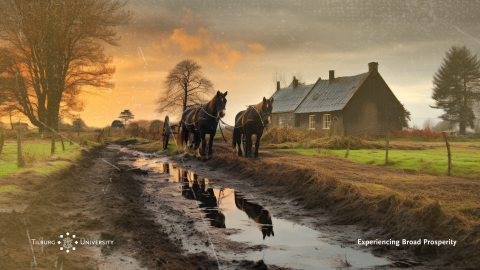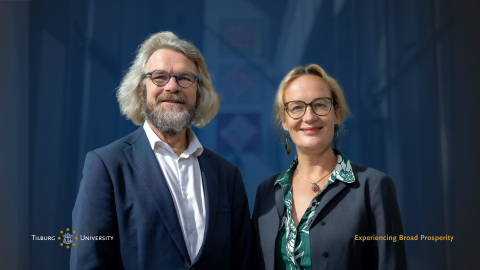Prosperity or wellbeing: What makes us happy? - Dies Natalis November 16
If you are not very rich, but healthy and happy, you will probably score highly on ‘broad prosperity’, a relatively new concept to measure and strengthen quality of life in a broad sense. But how exactly can we do so? Antoinette de Bont and Lex Meijdam have a dialogue on the subject and share with us their personal stories of happiness in life, about wellbeing and prosperity at the Dies Natalis on November 16. A sneak peek.
Antoinette de Bont is the Dean of the Tilburg School of Social and Behavioral Sciences (TSB). Lex Meijdam is Professor of Economics.
Antoinette: ‘Do you ever leaf through your old family photo albums? Maybe there are pictures of your grannies and granddads in front of their farms, proud of their first photo opportunity. The world has changed so much in such a short time. But have industrialization and the economies of scale really brought our ancestors nothing but prosperity and happiness? Was everyone able to keep up? And what things did they give up in exchange for growth, such as the solidarity of a village community, freedom, and the clean and healthy natural environment that certainly gave them quality of life as well?

The world has changed so much in such a short time. But have industrialization and the economies of scale really brought our ancestors nothing but prosperity and happiness?
Antoinette de Bont
Lex: ‘Technological and economic development certainly did not pan out well for everyone. For a long time, prosperity was simply expressed with a figure: the gross domestic product (GDP). The growth of this figure was considered the most important measure of prosperity in the Netherlands. Today it is generally accepted that the GDP provides only a limited picture and that we need to look beyond material prosperity. Economic growth based on the GDP comprises all production, also of matters that do not necessarily make us happy. A broader concept of prosperity also takes into account access to good education, healthcare, housing, security, air quality and the natural environment.’
Antoinette: ‘Why is broad prosperity such a hot item at the moment? You would think that we are more prosperous than we ever were. Increasingly many people are highly education and, on the face of it, our quality of life is much higher than that of my ancestors in the pictures.’
96e Dies Natalis
On November 16, 2023, Tilburg University celebrates its 96th anniversary. This year’s theme is broad prosperity.
Lex: ‘We increasingly realize that economic growth comes at a price with respect to our social and natural capital. Natural resources are depleted, climate change continues at a rapid pace. Not everyone is doing well. Social inequality is growing, people are in danger of economic and social exclusion. We face complex issues in the fields of healthcare, the aging population, a tight labor market, and poverty. Prosperity is not properly shared. Market forces do not necessarily work for the common good. In many cases, the government needs to step in to regulate the market. And even that government increasingly fails to respond.’
Antoinette: ‘Yes, it is clear that not everyone can keep up with all the changes. Increasingly many people do not identify with the policies pursued and they feel ignored.’
Lex: ‘That is why it is a good thing that policymakers and administrators are beginning to look differently at prosperity. For instance, the Dutch Social and Economic Council (SER) has formulated new objectives to the effect that it wants to promote entrepreneurship as well as decent work. And sustainable growth as well as a balanced distribution of income.’

We increasingly realize that economic growth comes at a price with respect to our social and natural capital
Lex Meijdam
Antoinette: ‘Personally I am very proud of the regional deal between the university, the government, and the region. The region is pre-eminently the place where people can be heard. As part of the deal, the university has committed itself to projects to increase the quality of life, housing, and work of both residents and entrepreneurs in the region. A case in point is a project for developing tools to help SMEs to work more sustainably and to comply with the EU’s Corporate Sustainability Reporting Directive (CSRD) in a cost-efficient manner. And a project called ‘Aan de bak’ (‘Get to work’) in north-west Tilburg, whereby companies guarantee jobs for young people and make agreements on working and studying.’
Lex: ‘I think that the university can contribute a lot to achieving broad prosperity. We have an important role in research and monitoring: comprehensively registering the ecological, economic, and social dimensions of broad prosperity. This enables us to formulate clear, measurable goals and parameters, and to show what works in practice.’
Personally I am very proud of the regional deal between the university, the government, and the region
Antoinette de Bont
Antoinette: ‘Collaboration is extremely important. Collaboration between science, practice, and citizens should not come at the end, when all the knowledge has already been fully developed, but at a much earlier stage. In our academic collaborative centers, these relevant parties converge to really buckle down to realizing broad prosperity. Ultimately, it’s not the policy on paper that matters but the action taken. Some choices may hurt. That cannot always be avoided because otherwise broad prosperity will be nothing more than a feel-good concept and nothing will really change.’
Broad prosperity and Tilburg University
A broad perspective of prosperity, and the premises of justice and equity, is in Tilburg University’s DNA. For that reason, broad prosperity is one of the university’s important strategic themes. Via academic collaborative centers and similar initiatives, Tilburg University uses its expertise to contribute in a practical manner to strengthening broad prosperity.
